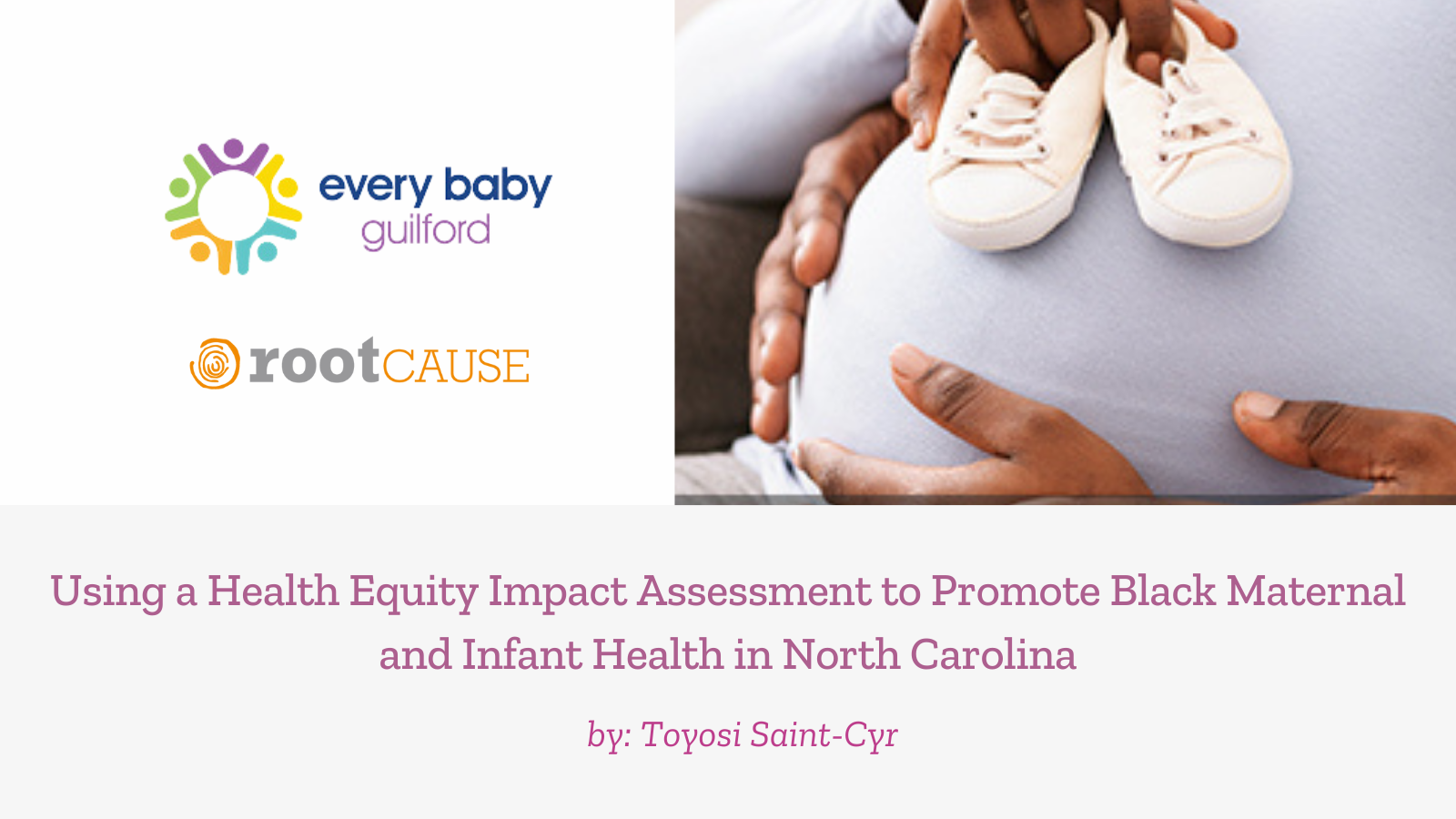In this field note, Toyosi Saint-Cyr, Advisory Services Manager at Root Cause, shares her reflections on our work with Every Baby Guilford, a Collective Action Movement in North Carolina.
Field Notes
Using a Health Equity Impact Assessment to Promote Black Maternal and Infant Health in Guilford County, North Carolina

Work is personal and all projects are not the same. While we often say this as consultants, they manifest in different ways depending on the project type, duration, work involved, and issue area. This week is Black Maternal Health Week, and there is no better time to spotlight our project with Every Baby Guilford (EBG). EBG is a radically inclusive collective action movement focused on maternal and infant health that is building collaborative solutions with a racial equity lens in Guilford County, North Carolina. This movement centers the community (parents, children, and families) and works together with community members, frontline caregivers, health care systems, civic and government leaders, faith-based organizations, city and county officials, and others to disrupt long-standing racial disparities in maternal and infant health.
The goal of EBG is to ensure more Black babies are born healthy and live to celebrate their first birthday. We know from countless studies about the racial health disparities that exist for Black mothers — Black women are three times more likely to die from a pregnancy-related cause than White women, and more than 80% of these deaths are preventable. We also know these racial health disparities exist for babies. 2020 data from the U.S. Department of Health and Human Services shows that Black infants are 3.8 times more likely to die from low birth weight complications. This tragic data reinforces the importance of the work our partners at Every Baby Guilford do every day.
EBG is more than just a client to our Root Cause project team. Our work with EBG reaffirms our commitment to advancing racial and economic equity and justice. Since 2020, Root Cause has partnered with EBG to improve the key factors driving maternal and infant health outcomes in Guilford County, North Carolina. Root Cause works with EBG’s staff and partners to build the backbone infrastructure and capacity for collective action, provide staff capacity-building support (e.g., staff onboarding and training), and develop the processes necessary for the successful alignment and implementation of EBG’s strategic priorities and interventions.
One of EBG’s strategies is to center the community with radically inclusive engagement to collectively create equitable solutions. In March, EBG used an evidence-based Healthy Equity Impact Assessment (HEIA) to engage community stakeholders in identifying strengths and areas of improvement for EBG’s reproductive health messaging efforts aimed at improving reproductive health in Guilford County. Our Managing Director, Consuela Greene, provided facilitation support during this HEIA process as part of EBG’s Improving Community Outcomes for Maternal and Child Health, or ICO4MCH grant. ICO4MCH is funded by the North Carolina Division of Health and Human Services (DHHS), Division of Public Health. HEIA is used to facilitate conversations about social drivers of health inequities and to engage community stakeholders in identifying innovations and solutions to improve health outcomes. This HEIA had two parts — a full-day hybrid session and a two-hour follow-up session. EBG engaged over 30 stakeholders who held different roles in the community. There were representatives from community-based organizations (CBOs), policy makers, observers, parents, advocates, doulas, and more. Participants joined remotely and in-person, and we saw people from all walks of life doing their part to transform their community; in this case, reduction of infant and maternal mortality.
Why is this important? Tools and practices like HEIA can be adapted to suit the unique contexts of communities for all types of health issues. HEIA is an important accountability practice for EBG. It creates a space for community stakeholders to engage with EBG staff, to explore underlying causes of health inequities within their community together, and to identify community solutions, channel advocacy efforts, and inform decision-making together. It was truly a unique experience to witness Guilford County’s stakeholders exemplify the practice of true community engagement through this process. Participants proposed specific, actionable solutions in addition to providing important insights on the historical and political context of this issue.
During this Black Maternal Week, we urge you to consider your own role in disrupting long-standing racial disparities in maternal and infant health. How can you contribute to collective action solutions that work to prevent pregnancy-related deaths in your community?
- Consider supporting organizations like Every Baby Guilford and other initiatives like Black Mamas Matter alliance.
- Learn more about Collective Action. Would you like to explore how Root Cause can support your Collective Action initiative? Use our contact form to reach out.
With Us
